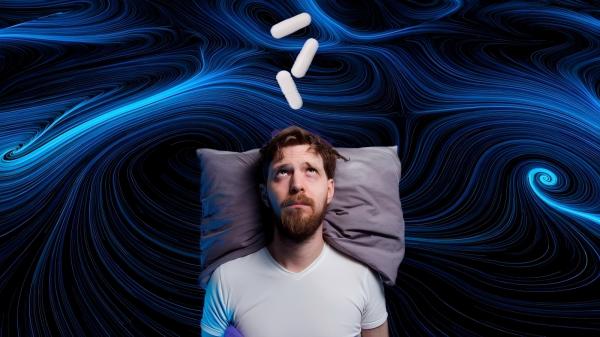
How Does Magnesium Improve Sleep? A Science-Backed Guide to Better Rest
Struggling to get enough shut-eye? It could be as easy as getting on board with magnesium. This vital nutrient is responsible for sleeping soundly through its property of calming down the nervous system and adjusting neurotransmitters responsible for sleep.
It has been confirmed that magnesium is responsible for the release of more GABA, which is a natural compound that eases the mind and triggers deep sleep. Besides helping the body produce melatonin, the natural sleep hormone, magnesium also takes control of the hormone, making it easier for you to maintain your sleep-wake cycle.
The reason magnesium is on your mind whether you have occasional insomnia or the problem is chronic is that you now know more about how magnesium sleep function work and shift in the monopoly of the solution to better night rest. In this scientifically-based guide, we will cover the following topics:
• The way magnesium impacts your sleep phase
• The best doses to sleep better
• Supplements with magnesium that differ in compositions
• Foods that are naturally rich in magnesium
• Possible side and security measures
Let's look at the science behind magnesium and see how this element can improve the quality of your sleep.
Key Takeaways:
- - Magnesium has a direct effect on sleep as it regulates neurotransmitters such as GABA and melatonin, which assist your organism in maintaining a normal sleep/wake cycle.
- - Various kinds of magnesium supplements are offered, and magnesium glycinate is a good choice because it is highly absorbed and has a tranquilizing effect on the body.
- - The proper measured daily magnesium is individual but the most adults need 300-400mg per day for sleep quality and weightless in general if you are attempting to reach your goals of better rest and over-all well-being.
The Science Behind Magnesium and Sleep
Magnesium is the most important mineral that keeps our sleep-wake pattern in control operating via various vital biological mechanisms. Let's research how this primary mineral works its charm for sleep.
Neurotransmitter Regulation
Magnesium works the same way on the nervous system as a depressant binds GABA receptors in our brain. GABA is an inhibitory neurotransmitter that helps to pacify neural activity and thereby reduce the stress. When magnesium levels are at their maximum, it increases GABA's ability to work effectively, and it becomes more comfortable for your mind to slow down allowing you to fall asleep.
Melatonin Production Support
This mineral plays a key role in controlling melatonin which is the so-called "sleep hormone". It supports the pathways which are needed for melatonin production and release, in this way keeping your natural circadian rhythm in balance. Magnesium works by synchronizing your internal clock, thus promoting sound sleep.
Muscle Relaxation
Magnesium is a naturally occurring, muscle relaxant that operates by way of calcium channels which block and thus reduce muscle contractions. This leads to the prevention of nighttime muscle cramps and the promotion of physical relaxation thus falling into a sleep state is made easier. The use of magnesium is pivotal among people suffering from restless legs syndrome or muscles twitching at night.
Stress Response Management
Through the use of magnesium, your body also plays an active role in the regulation of the hypothalamic-pituitary-adrenal (HPA) axis and thus initiates your stress response. Balanced magnesium levels could give more control over cortisol, a stressful hormone that impedes sleeping function. So, the use of natural sleeping aids must be one of the strategies to eliminate insomnia.
Neural Plasticity Enhancement
New studies, on the other hand, have indicated that magnesium, especially L-threonate magnesium, can augment the plasticity of the brain. This synaptic function is seen as the first thing to attack the neurons when talking about restful sleep. Therefore, better sleep is identified as a marker during the brain’s self-regulation process.
Key TakeawayIn the case of such supplements as magnesium, various transmitters that might cause extreme sleeping can be regulated, melatonin may be produced, tonus of muscles may be normalized, stress response may be controlled, neural plasticity may be increased, and the final result may be sleeping of better quality.
Different Types of Magnesium for Sleep Enhancement
One of the first things you would want to know when it comes to treatments will be the different types of magnesium and their suitability to your problem. Unlike some forms, magnesium oxide is not digested in the body and is only 4% absorbed, so the rest is excreted in urine. Finding the form that is most suitable for each individual’s needs is crucial.
Magnesium Glycinate
Magnesium glycinate is a compound of magnesium and glycine, which is a calming amino acid. No less important is the fact that it is also gentle on the stomach and highly absorbent, implying a better sleep for the user. The amino acid glycine, which is involved in the biosynthesis of glutathione, also facilitates the release of energy from DNA position.
Magnesium Citrate
Magnesium citrate is among the variants that are more famous and efficient due to the presence of citrate. Although its purpose is for sleep, it can also be used as a weak laxative. This version is the best for individuals needing sleeping support and dealing with temporary or periodic constipation issues.
Magnesium L-threonate
This alternative form is specifically designed to easily and successfully pass through the brain-blood barrier. Research indicates that it may be unique to promote memory and sleep. This form is commonly suggested to elderly people suffering sleep disturbances due to age-related issues or cognitive disorder.
Magnesium Taurate
Once the grinded minerals are linked with taurine, they generate a tool for sleeping that is most potent. The type of taurine that is related to the neural system is the one that calms the nerves to be relaxed during the sleep and magnesium is the one that enhances the sleeping and reduces anxiety.
Magnesium Malate
The magnesium aids the absorption of malic acid that then acts as a replenisher of the energy lost by the body. Practically, this is another minor part but is a key component of the form that aids the energy crisis or the fibromyalgia aggravation of the sleeping problem.
Magnesium Oxide
This sort of magnesium, even being common, has lower absorption rate compared with other types. While it can still enhance your sleep, the experience may require higher doses than what are necessary with more bioavailable forms.
Magnesium Chloride
Its a form of magnesium that is high in salt and is used typically in the skin in the form of oils or bath flakes. It, however, can be taken in through the skin. It is ideal for users who have trouble in the gut with oral supplements or need multiple delivery ways.
Key InsightPrefer magnesium glycinate or L-threonate to improve your sleep, as these types of magnesium are absorbed better and have sleep-promoting properties while being mild to your digestive system.
Optimal Dosage and Timing
Recommended Daily Intake
Depending on age and gender, the ideal quantity of magnesium varies. For women, the recommended daily allowance (RDA) is 310-320mg, and for men, it is 400-420mg. In case you are using magnesium specifically for sleep, go with a smaller quantity of 200-300mg a day, and and then see if the results are there or not.
Best Time to Take Magnesium
Ingesting magnesium about 1-2 hours before sleep is beneficial for enhancing the amount of sleep you will get. At this time, your body can absorb the mineral well and it can start its relaxing effects when you need them. You can take the full dose at once or you can divide it into smaller doses and take them at different times, but taking it near bedtime makes it more effective.
Factors Affecting Dosage
A few things determine how much magnesium is right for you. Your age, patency to other health issues, the drugs you are taking, and your magnesium levels currently are all influential factors. Consult your healthcare provider if you are dealing with chronic insomnia or taking medications to know the right amount that suits your case.
Safety Considerations
Magnesium is for the most part safe; however, surpassing 350mg of magnesium via supplements every day. could cause digestive disorders like diarrhea or nausea. Begin with a smaller amount and increase it slowly as you watch your body's signs. Incase you are having side effects, reduce the dose or visit a healthcare expert.
Absorption Tips
Take magnesium supplementation with food to absorb more and avoid potential stomach complications. Taboo taking them with high-fibre meals or calcium-rich foods, because they can interrupt the magnesium inclusion. Staying well-hydrated throughout the day is still your body's way to ensure perfect utilization of magnesium, you know.
Key TakeawayFor optimal sleep benefits, take 200-300mg of magnesium 1-2 hours before bedtime with food, while considering personal factors and potential interactions to ensure safe and effective supplementation.
Natural Sources of Magnesium
Eating all the magnesium you require through your diets is the healthiest and most effective method of maintaining restful nightly patterns. Come with me; I have some food items that are both luxurious and easy to obtain, which contain the essential mineral of magnesium. We shall look at them together.
Leafy Greens and Vegetables
Spinach, Swiss chard, and kale are the top magnesium-rich foods out there. Just one cup of cooked spinach contains about 157mg of magnesium. Other vegetables such as avocados, black beans, and edamame are also high in magnesium.
Nuts and Seeds
One tablespoon of pumpkin seeds has the most magnesium concentration with 156 mg. Almonds, cashews, and Brazil nuts are also high-quality magnesium sources. If you consume one of these daily, you will be able to eat a lot more magnesium.
Whole Grains
Among the above list of foods we have brown rice, quinoa, and whole wheat bread, which were identified as good magnesium sources. Cooking brown rice for one time can provide you with approximately 86mg of magnesium, a super choice for your dinner course.
Fish and Seafood
Fatty fish such as salmon and mackerel turn down the volume of magnesium in the brains, thereby ensuring a restorative sleep. A small mackerel serving contains around 82 grams of magnesium.
Dark Chocolate
Dark chocolate with a cocoa content of 70% or higher loads magnesium content around 64 mg of per ounce. With the sweetness that dark chocolates provide, it is definitely one of the best solutions to increasing the intake of magnesium, though take it in the morning to avoid interference with caffeine keeping you awake at bedtime.
Key TakeawayAdding some foods high in magnesium such as leafy greens, nuts, whole grains, fish, and dark chocolate to your daily diet will help your body get the right sleep and overall health it needs.
Benefits Beyond Better Sleep
Although magnesium is best known for the sleep-inducing effects that it has, the most unique and big benefits that this nutrient can provide are besides just helping you get a good long sleep. We are going to dive into key information discussing the unbelievable support magnesium gives towards our overall well-being.
Mood Enhancement and Stress Reduction
Magnesium takes the lead in the regulation of neurotransmitters that are responsible for the behavior of the mind and the emotion of stress. It makes sure that GABA, a calming and relaxation neurotransmitter, is at the right levels. Research findings have demonstrated that sufficient magnesium uniformity has relation to the anxiety levels and a positive emotional state.
Muscle and Bone Health
Magnesium is highly critical for muscle functions and is necessary for proper bone development. It is the cause of muscle cramps, and spasms, and the reason for muscle contractions is its regulation. Magnesium is viewed scientifically as one of the agents linked to osteoporosis disease prevention and improvement of bone density with the addition of calcium and vitamin Dprove in the bones.].
Heart Health Support
Magnesium plays a major role in cardiovascular health. It helps to regulate heartbeat, sustains normal blood pressure, and also controls the proper circulation of blood throughout the vassals. Regular magnesium intake has been associated with a decreased risk of heart disease and better cardiac function.
Energy Production and Exercise Performance
Magnesium as the main substrate in energy metabolism helps to construct energetic substances for the body to leverage. Athletes, as well as, physically active people, may get enough benefit from having sufficient magnesium levels in their bodies, as it promotes muscle recovery, reduces exercise-induced inflammation, and helps to maintain the electrolyte balance during physical exercising activities.
Brain Function and Memory
It has been found that magnesium, primarily magnesium L-threonate, enhances cognitive ability and memory lately. It bolsters brain plasticity, i.e., the ability of the brain to generate new connections, - which is pivotal for learning and memory consolidation.
Key TakeawayBesides enhancing the sleep cycle, insufficiency of magnesium has brought about a range of health conditions including mood impairment, weakened bone mass, and muscle health, cardiovascular disease, fatigue and dementia.
Trending Magnesium Sleep Solutions
Inorning in the last days, the emergence of innovative magnesium-based sleep solutions has been noted, so the opportunity to take advantage of the sleep-inducing benefits of this mineral has been created. These novel methods, with their combination of scientific insight and practical applications, are aimed at solving the rest problem.
Magnesium Sleep Sprays
Transdermal magnesium sprays are the newest real-life stars in natural sleep aids. These sprays are designed to be used on the body, mainly legs and arms, which tissue is gently massaged with it at night. It is the major part of checking benefits; they speed up time and avoid digestion, which usually took long till the beneficial effects started.
Smart Magnesium Supplements
Innovative magnesium preparations now consist of magnesium plus other sleep-friendly elements that improve sleep. These smart supplements usually contain magnesium glycinate or threonate infused with elements such as L-theanine or GABA for better sleep properties. The major part of the new product range designed to help clients suffering from sleep apnea is the time-release formula, where the body is provided with a slow magnesium-release throughout the night.
Magnesium-Infused Sleep Products
The expanded business has brought into life sleep add-ons enriched with magnesium. From pillowcases treated with fabrics infused with magnesium to bath products that include magnesium flakes, these modern innovations provide indirectways of assuring adequate magnesium. Sleep masks made of magnesium, as well as bedding materials that incorporate magnesium-based technologies, are also gaining interest and are as well among the sleep aids.
Digital Integration
Evaluations of the better quality of sleep an individual had the night before might be one of the indicators that could be available for analysis in this type of application. The app will now be compatible with the devices through which you can monitor your magnesium levels while you are on the go. Such apps typically issue suggestions regarding the best time and dosage for magnesium intake based on the person's sleep data and objectives.
Combination Therapies
Healthcare practitioners are increasingly recommending non-pharmaceutical interventions, in general, that combine supplementation with other sleep-inducing factors like magnesium. At a minimum, the integrative program could be composed of natural magnesium-rich night rituals, specific breathing exercises, and specifically devised relaxation models that optimize sleep benefits.
Key TakeawayCurrently, the state of the art of magnesium sleeping aids is represented by innovative ways of administering magnesium and the usage of technology and holistic methodologies. By this means, they are more equipped to provide the best individualized solution for sleep improvement.
Safety and Precautions
In general, magnesium supplements are safe drugs. However, it is necessary to be careful and mindful when using them. When considering the important safety principles and precautions, you are supposed to adhere to, we will now develop them.
Potential Side Effects
The most common among them are diarrhea, nausea, and stomach cramps. These ailments occur either with excessive intake or when the body is trying to adjust to the supplement. To begin with, one can start with a small amount and gradually increase the dose to circumvent this kind of issue.
Drug Interactions
Magnesium can have a negative interaction with all sorts of medications, including antibiotics, diuretics, and a few heart ones. It is absolutely necessary to keep that time free of other medications to make sure proper absorption of both kinds.
Who Should Exercise Caution:
People having kidney issues should be cautious with magnesium intake, because their bodies might have problems in the case of processing and throwing away the excess magnesium. The ones with heart troubles or who use blood pressure medications are suggested to visit health advisor prior to beginning supplementation.
Recommended Safety Measures
Always go for the smallest effective dose at first and control how your body reacts to it. Also, avoid stomach discomfort by taking supplements with food that enhance their absorption. In the event of any unusual symptoms, cease the intake and seek professional help immediately.
Signs of Magnesium Overdose
Look for magnesium toxicity symptoms such as severe diarrhea, muscle weakness, low blood pressure, and irregular heartbeat. Even if it is unlikely, it affects the lives of specific people who experience it opt for deadly results. taking too much magnesium is a cause of some serious complications in certain individuals.
Key TakeawayWhen magnesium supplementation proper precautions such as starting a low dose, noticing side effects regular, and consulting healthcare providers are taken. The process of safe supplementation is important.
Conclusion
The persuasive scientific proof of magnesium in improving deep sleep is the reason why it is such an effective tool in enabling people to sleep well again. Apart from consuming magnesium in the form of food, you can nourish yourself with that mineral by buying the right supplements to better your life which in turn will enhance your sleep quality.
Begin with the recommended daily allowance and talk to your doctor before you adopt any supplementation, if at all, you are on other health issues. Whether they pick MgGly or else, they take their calm drinks, and make their diet be magnesium-rich foods. It is surely by keeping to the aforesaid that one is bound to fully benefit from the supplements completely.
FAQs
Can I take magnesium supplements with other sleep aids?
The magnesium has a low risk of being mixed with melatonin for sleep. However, the doctor's advice is still required. Some combinations may interact with each other or the drug effect may increase up to disorders of consciousness. Alternatives such as melatonin are normally okay to mix with magnesium, but it is still recommended to begin with smaller doses to check the tolerability of the mix.
How long does it take for magnesium to improve sleep quality?
Most people who take magnesium supplements to help improve sleep have a notable difference in 1-2 weeks. Nevertheless, personal experiences may be different and come from the different amount of doses, kind of magnesium, also your informative magnesium amount at the time of the study. To get the best results, be consistent in the timing of the supplementation.
Is it better to take magnesium in the morning or at night for sleep?
For the most profound results, it would be the best if you took magnesium an hour or two before going to bed. At this time, magnesium is assimilated into your body and will start to work as you prepare for sleep. On the other hand, if you experience stomach-ache, it is better to take it at dinner.
Can magnesium supplementation cause vivid dreams?
Some users have pointed out that they had more vivid dreams when they were using magnesium supplements. This is not necessarily wrong - it might be connected to the achievement of deeper, serene sleep phases. If vivid dreams are distressing, you could try decreasing your dosage or take the supplement earlier in the evening.
Does magnesium help with sleep anxiety?
Yes, magnesium is one of the solutions for sleep anxiety, it acts as the most calming agent. Therefore, it is a must for the nerve system to work properly and for stress hormones to come into balance. With the help of GABA receptors, it promotes restfulness and restricts the racing thoughts that usually disrupt the sleep patterns. Affirmatively, functional regulations enable improved sleep. Regular supplementation may help establish a more relaxed bedtime routine.
Are there any specific foods I should avoid when taking magnesium for sleep?
Do not eat foods rich in calcium at the same time with magnesium supplements, since calcium can be absorbed instead of magnesium which will have a negative impact. In addition, restrict the intake of caffeine and alcohol, especially during the evening, as it is a certain fact that these beverages may result in both magnesium absorption and sleep quality interference.





![Blood Pressure Chart Guide: Understanding Your Readings for Better Health [2025]](http://bkwat.com/cdn/shop/articles/Blood_Pressure_Chart_Guide.jpg?v=1734339250&width=612)
